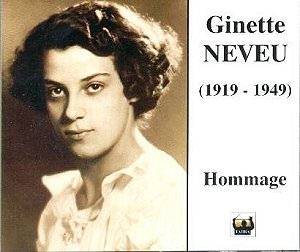AVAILABILITY
www.tahra.com
There are real riches in this three CD set from Tahra
dedicated to Ginette Neveu. The Brahms Concerto with Desormière
and the D minor Sonata with her brother Jean make their first appearance
Ė remarkable survivals Ė as does the Beethoven Concerto performance
with Van Otterloo. Iím not aware that the two radio interviews conducted
with her in 1949 have ever been published either so, with the exception
of the Rosbaud Beethoven, this is, in effect, all new to the catalogue
and as such worthy of the highest interest.
Of the two Beethoven performances the finer is that
directed by Rosbaud. There is a characterful sensitivity and sweetness
to Neveuís playing in the first movement of this 1949 traversal - the
odd intonational lapse aside Ė even if the recording itself is rather
close up, sufficient at any rate to catch the violinistís constant sniffing.
Rosbaud characterizes the brass behind her from 13.00 with insistent
unease Ė indeed he points up myriad little cogent architectural-expressive
details, exploring the turbulence of the work in a way few other conductors
manage. One of Neveuís few besetting faults was a tendency to rush bars
and she does so here just before the cadenza but her subsequent control
is one of real strength and pliancy, terracing her dynamics accordingly
and ending the movement with strength. In the slow movement one can
best appreciate Neveuís strikingly Gallic use of vibrancy and colour.
Intensely expressive at a relatively slow tempo with perfectly judged
diminuendos, her vibrato usage here is charged both with depth but also
with speed change. Her slides are affecting, though perhaps a little
out of style for this period. The horns have some real problems after
the orchestral introduction to the Rondo finale but otherwise all is
affectionate, if leisurely, with some irresistible lift and life in
the playing. Strong contouring comes from the conductor Ė but there
are some signs that Neveu is tiring toward the end with occasionally
loose playing. Still this is a marvelous example of her musicianship
caught on the wing.
The Van Otterloo performance with the Radio Filh. Orkest
- Iím not quite sure who they are Ė doesnít operate at quite such an
exalted level but is still full of interest. Van Otterloo is inclined
to be more emphatic and abrupt, less obviously subtle than Rosbaud.
Tuttis are rather hammered out, the chording is more unyielding, the
fortissimi tending to the extreme. Neveu herself is also on slightly
less seraphic form in this performance given five months before the
Rosbaud. The first movement is noticeably quicker than later in the
year, Neveuís portamenti slightly more pervasive here and she employs
a different cadenza (Iím sure I should but I donít recognize it). As
ever she vests the passage immediately following it with intensified
vibrato usage and colouristic breadth, truly treasurable playing. Perhaps
some her slides in the Larghetto, whilst tastefully lyric-expressive
devices seem slightly over done but she brings the same benevolence
and sophisticated tonal variance to bear here as she was to do with
Rosbaud. I think the complete success of the finale is vitiated somewhat
by some leaning on notes and phrase endings by orchestra, conductor
and soloist alike. Whatís missing is the sense of naturalness Rosbaud
engendered here.
Desormièreís conducting of the Brahms Concerto
is a striking example of subjective intelligence. He indulges some very
extreme tempo rubato in the orchestral introduction Ė full of flexibility
and elasticity of phrasing. Neveu is, as with her commercial disc, intense
and propulsive in this work She vests her line with some succulent phrasing,
big boned, and portamenti feature strongly amongst her arsenal of inflective
devices. Maybe thereís a temporary lack of orchestral clarity from 8.30
onwards and Neveu is still inclined to jump her bars once or twice but
this is still a formidable pairing of talents. The recording overloads
at fortissimi from time to time but only the super scrupulous will mind.
Her colouristic palette reigns in the slow movement though possibly
some might find her a little glutinous at certain moments. There is
once more overload in the finale Ė percussion his time Ė but this is
strong, agile and commanding playing even if, so far as Iím concerned,
there is also a hint of rhythmic unsteadiness as well. The companion
performance on this last disc is of the Op 108 Sonata, recorded just
a month before the deaths of both Ginette and Jean. Thankfully there
is little of that rather seasick rhythmic licence that some violinists
insist on visiting on the opening Allegro. Instead this is a confident
and alert performance in which Neveu reserves, as ever, her wider vibrato
palette in the slow movement. She also employs some emotive finger position
changes, and a depth of vibrancy well-suited to Brahms; instead of doing
too much too early here with the expressivo material she freights and
colours her line, reserving passion for the most acute structural moment
later in the movement. The presto third movement is witty and elegantly
elusive Ė thereís a typo in the booklet here; it lasts 2.58 not 7.58.
The finale opens with some rather rhetorical pauses but is resolutely
controlled.
The disc also includes two interviews conducted in
May and September 1949 Ė in one of them we can hear Jean as well. The
booklet prints a translation, though Iím sure composer Josef Suk would
be surprised to find that he was born in Cracow (it was Krecovice).
As one who finds the preserved voice touching these interviews Ė albeit
entirely scripted, as was the custom Ė are precious mementos.
This is a set of major importance. It collates much
previously unpublished material and the supporting documentation is
good. Neveuís status is such that all off air material is precious;
to have such heavyweight repertoire, which she otherwise did not record,
is something of which we are the fortunate beneficiaries.
Jonathan Woolf
